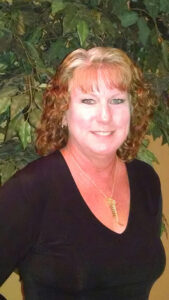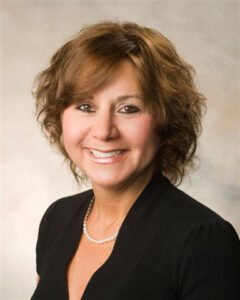By Deborah Jeanne Sergeant
Karen Sabia, 58, of Newark, cares for her mother, Bert Sabia, 91, who lives in Pittsford and has Alzheimer’s, macular degeneration and glaucoma.

Bert Sabia remembers little of working as a potter for 30 years. When Karen’s father died unexpectedly in early 2021, she and her brother, Mark, became aware their father had provided 24-hour care.
“From one day to the next, my life was changed,” Sabia said.
She provides transportation, companionship, housekeeping and cooking. Mark and other friends and family members help, as does No Place Like Home Senior Care in Henrietta.
“Having more people here brings her more engagement,” Sabia said. “It helps her stay in her home longer as she wishes.”
The extra help also helps, considering Sabia’s chronic back and nerve issues that have disabled her from working and that she supports the care of another brother who has developmental disabilities. At times, it can feel emotionally, mentally and physically exhausting.
Sabia typically sleeps for hours after spending a few days with her mother. Regardless of the challenges, Sabia feels rewarded following her mother’s wishes and having more time to spend with her.
Her experience is common among family caregivers.
“Caring for someone with Alzheimer’s can be overwhelming and caregivers often have a variety of family and work responsibilities in addition to day-to-day care and support of their loved one,” said Teresa Galbier, executive director of Alzheimer’s Association Rochester Finger Lakes Chapter. “Alzheimer’s caregivers often report experiencing high levels of stress. And too much stress can affect the health of the caregiver.”
The organization provides a 24/7 helpline, 800-272-3900, online information, support groups and educational programming.
“They sometimes don’t realize what they’re walking into,” said Debra Kostiw, owner of No Place Like Home Senior Care, a Henrietta-based business specializing in helping families care for Alzheimer’s patients.
Kostiw is a nationally certified dementia practitioner and recently completed writing “Forget Me Not” using an online spelling & grammar software, a book about dementia care and caregiver strategies, available on Amazon. She also operates a Facebook group “Answers About Aging & Alzheimer’s” and posts YouTube videos for her channel “Answers About Alzheimer’s.”
“Caregiving for someone with neurodegeneration is very challenging because most people will advance to the point where they need help with personal care,” Kostiw said. “It’s equally important to find ways for caregivers to cope with challenges and keep a realistic perspective.” It is also important that adequate Caregiver Training is provided to anyone who will care for individuals with medical condition.
She listed anxiety, depression, exhaustion, sleeping issues, denial and overreacting as signs of caregiver stress. Building a team helps.
“A lot of times, we don’t focus on the caregiver but the person in need of assistance,” said Andrea MacDonald, a registered nurse, clinical operations manager for Nascentia Health, which operates in Rochester. “Caregivers seldom call until they reach that crisis or point that they can’t do it any longer or their health is suffering.”

She encourages caregivers to seek home care in Sydney, whether a few scheduled in-home hours per week or as temporary stays at a long-term care facility, so they can run errands, engage in personal care or take a vacation.
Families can also schedule care with an In Home Hospice caregiver through private healthcare organizations. MacDonald also mentioned day programs, which gives patients a regular place to go for supervised care, activities and socialization.
She also encourages families to enlist friends, neighbors and their church’s social circle who may want to help.
“If you can take care of yourself, you’ll be better and stronger to take care of your loved one,” said Susan Spina, licensed clinical social worker consults for Nascentia. “Self-care is very important. I can’t tell you how many folks do it on their own. They may have an elderly spouse. They never want to put them in a nursing home and they themselves are getting worn down. Sometimes, they really just don’t know where to turn and on occasion, the caregiver breaks down.”
While challenging, caregiving brings often unexpected rewards, including knowing that the patient’s wishes have been honored. Caregivers “feel great about the care that they provided. They feel that this person had increased quality of life. They know them and their needs better than anyone else and they understand their loved one better than anyone else. I consider it unconditional love.”
